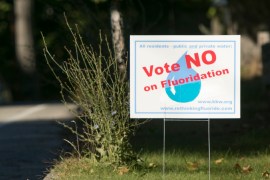Today’s early morning highlights from the major news organizations, including reports examining how mental health issues play a role in efforts to curb gun violence and expand gun control efforts.
The New York Times: For ‘Party Of Business,’ Allegiances Are Shifting Big business is so fearful of economic peril if Congress does not allow the government to keep borrowing — to pay creditors, contractors, program beneficiaries and many others — that it is nearly united in skepticism of, or outright opposition to, House Republicans’ demand that Mr. Obama first agree to equal spending cuts in benefit programs like Medicare and Medicaid (Calmes, 1/15).
Politico: AARP’s Barry Rand: Mend, Don’t End Entitlements The head of the AARP on Tuesday acknowledged changes must be made to programs like Medicare and Social Security, but said cuts to those entitlements aren’t a solution to the nation’s fiscal woes (Glueck, 1/15).
For more headlines …
USA Today: New Website Part Of Push For Uninsured To Get Coverage The federal government Wednesday kicks off an effort to raise awareness about the most controversial part of the health care law — the requirement that the uninsured buy health care insurance. Wednesday morning, the Department of Health and Human Services plans to relaunch its website to try to draw in the millions of uninsured people needed to make the health care law work when open enrollment in state and federal health care exchanges begins in October (Kennedy, 1/16).
The Associated Press/Washington Post: US Appeals Judge’s Ruling Allowing Religious Publisher To Reject Contraceptive Coverage The Obama administration is appealing a judge’s order that is temporarily preventing the government from forcing a Christian publishing company to provide its employees with certain contraceptives under the new health care law (1/15).
Politico: Biomedical Science At Stake With Sequestration From his perch at the National Institutes of Health’s sprawling campus in Bethesda, Md., Director Francis Collins is eyeing the impending sequestration cuts warily. If lawmakers don’t find a way to blunt the across-the-board cuts, the government’s premier medical research center will lose 6.4 percent of its budget — a cut Collins calls a “profound and devastating blow” for medical research at a time of unprecedented scientific discovery (Cunningham, 1/16).
The Wall Street Journal: Pension Funding Gap Widens For Big Cities Major U.S. cities emerged from the financial crisis with increasingly underfunded pension and retiree health-care plans, according to a study released Tuesday. Cities employing nearly half of U.S. municipal workers saw their pension and retiree health-care funding levels fall from 79% in fiscal year 2007 to 74% in fiscal year 2009, using the latest available data, according to the Pew Center on the States (Ackerman, 1/15).
The Washington Post: Obama To Announce Most Expansive Gun-Control Agenda In Generations In addition to background checks and restrictions on military-style guns and ammunition magazines, Obama is expected to propose mental health and school safety initiatives such as more federal funding for police officers in schools, according to lawmakers and interest group leaders whom White House officials briefed on the plans (Rucker, 1/15).
Los Angeles Times: New York State Adopts Toughest Gun Laws In U.S. The Secure Ammunition and Firearms Enforcement Act, or SAFE Act, gives New York the toughest gun laws in the nation and touches on the mental health issues that both pro-gun and anti-gun activists say should be part of any new legislation. Among its key provisions is one requiring the revocation or suspension of gun licenses held by people who are deemed a danger to society by mental health workers. The bill would require mental health workers to report such patients to authorities (Susman, 1/15).
The Associated Press/Washington Post: Experts Say Proposed NY Gun Law Could Hinder Mental Health Treatment Of Dangerous People Mental health experts say a new tougher New York state gun control law might interfere with treatment of potentially dangerous people and even discourage them from seeking help (1/15).
The Wall Street Journal: Law’s Mental-Health Provision Draws Ire The measure requires physicians, psychologists, nurses or clinical social workers to alert local health officials if a patient “is likely to engage in conduct that would result in serious harm to self or others.” After an evaluation, the health officials would pass on the person’s information to law-enforcement agencies that would be authorized to seize any firearm owned by the patient. If a person is found not to own any firearms, the patient would be added to a statewide criminal background check database, marking a significant expansion of who would be made ineligible to legally buy a firearm (El-Ghobashy, 1/15).
The New York Times: Warning Signs Of Violent Acts Often Unclear That hard fact drives the public longing for a mental health system that produces clear warning signals and can somehow stop the violence. And it is now fueling a surge in legislative activity, in Washington and New York. But these proposed changes and others like them may backfire and only reveal how broken the system is, experts said (Carey and Hartocollis, 1/15).
Los Angeles Times: NYPD To Try GPS In ‘Bait Bottles’ To Track Drug Thieves New York police plan to distribute “bait bottles” of fake pain-killers equipped with invisible GPS devices in a drive to combat the scourge of pharmacy robberies by addicts and sellers looking for oxycodone tablets, which can fetch more than $80 per pill on the street. New York Police Commissioner Raymond Kelly announced the novel approach at the 2013 Clinton Health Matters Conference in La Quinta on Tuesday, saying his city’s cases of oxycodone-related crime have included a retired police officer who resorted to robbing pharmacies to satisfy his craving for the highly addictive narcotic (Susman, 1/15).
The Wall Street Journal: Delays In Medicaid Pay Vex Hospitals Hospitals in Maine, concerned that further deficit-reduction agreements in Washington could erode funding for Medicaid, are demanding hundreds of millions of dollars in back payments from the state for treatment of patients in the program. States across the nation have long been slow to reimburse hospitals for treating needy Americans in the Medicaid program, but hospitals usually haven’t quibbled, knowing they would be paid eventually. But now, a coalition of 39 Maine hospitals is demanding $484 million in Medicaid payments owed for bills dating to 2009 (Levitz and Radnofsky, 1/15).
KFF Health News is a national newsroom that produces in-depth journalism about health issues and is one of the core operating programs at KFF—an independent source of health policy research, polling, and journalism. Learn more about KFF.Some elements may be removed from this article due to republishing restrictions. If you have questions about available photos or other content, please contact khnweb@kff.org.



